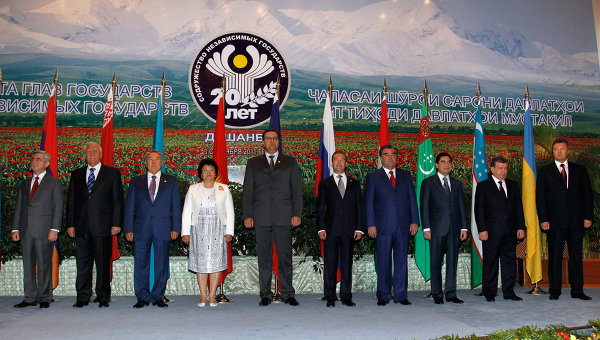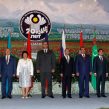
Post-Soviet Groupings Face Security Challenges
Publication: Eurasia Daily Monitor Volume: 8 Issue: 170
By:

The latest summit meeting of the major post-Soviet grouping pledged to intensify efforts to counter security challenges. However, this and other top-level gatherings of former Soviet states highlight increasing disagreements between member states on a variety of issues. The Kremlin has repeatedly prioritized a conflict-settlement agenda. In a speech on September 8, Russian President Dmitry Medvedev advocated countering ethnic conflict and illegal migration (Interfax, RIA Novosti, September 8).
The statement came in the aftermath of a summit meeting of the Commonwealth of Independent States (CIS). On September 3, Tajikistan hosted the CIS summit to mark the twentieth anniversary of the organization. The CIS leaders said in a joint statement that any conflicts in the commonwealth must be solved in accordance with international law. They also pledged to counter extremism and illegal migration. Medvedev and his Kazakh counterpart, Nursultan Nazarbayev, hailed the CIS as an efficient example of multilateral cooperation (Interfax, ITAR-TASS, RIA Novosti, September 3).
The next CIS summit is due to be held November 2012 in Ashgabat, since Turkmenistan has assumed the rotating presidency of the CIS. On September 2, President Gurbanguly Berdimuhamedov promised to ensure a “positive and constructive” CIS presidency by Turkmenistan. CIS cooperation remained Turkmenistan’s foreign policy priority (Interfax, September 2).
However, the CIS summit in Dushanbe was marred by a number of divisive issues. It was attended by the presidents of Armenia, Kazakhstan, Kyrgyzstan, Moldova, Russia, Turkmenistan and Ukraine, while the leaders of Azerbaijan, Belarus and Uzbekistan were absent. During the CIS summit, economic disagreements between Russia and Ukraine resurfaced. Meanwhile, the Uzbek President Islam Karimov apparently demonstrated his opposition against plans discussed in Dushanbe and supported by Russia, to export electricity from Kyrgyzstan and Tajikistan to Afghanistan and Pakistan.
In recent months, Karimov has apparently preferred to distance himself from post-Soviet organizations. Notably, he declined to attend the informal summit of the security grouping, the Collective Security Treaty Organization (CSTO). On August 12, the CSTO held an informal meeting in Astana and pledged to face new security challenges. After the summit, Belarusian President Alyaksandr Lukashenka said that following the Arab and North-African revolts, the CSTO member states had to face what he described as “information and cyber threats” (Interfax, ITAR-TASS, RIA Novosti, August 12).
Since 2009, Uzbekistan has declined to sign many of the CSTO’s agreements. Nonetheless, on August 15, CSTO Secretary-General Nikolai Bordyuzha said the organization had no plans to expel Uzbekistan, following Karimov’s decision to avoid the Astana summit. He expressed hope that the Uzbek president would attend the CSTO summit in Moscow on December 20, 2011 (Interfax, August 15). Meanwhile, some member states apparently remain unhappy about Karimov’s independent stance. On August 16, President Lukashenka said those CSTO member states that remained reluctant to cooperate should leave the organization (Interfax, RIA Novosti, August 16).
The CSTO, which includes Armenia, Belarus, Kazakhstan, Kyrgyzstan, Russia, Tajikistan and Uzbekistan, currently possesses collective rapid deployment forces (KSBR), due to be replaced by the Russian-led Rapid Reaction Force (KSOR). In June 2009, CSTO leaders signed an agreement to form the KSOR, although two member states abstained. The CSTO summit in Moscow in June 2009 agreed to form a Russian-based collective rapid reaction force to respond to regional security challenges, but Belarus and Uzbekistan declined to sign the KSOR agreement. Belarus also refused to assume the CSTO rotating presidency due to economic disagreements with Moscow, forcing Russia to assume the CSTO’s “temporary presidency.” However, Moscow and Minsk managed to settle their differences eventually. Furthermore, the Belarusian leader floated an idea of using the CSTO collective forces to counter perceived attempts to overthrow his regime. On August 30, Lukashenka argued that the CSTO member states negotiated the use of the KSOR forces to prevent foreign meddling and coup attempts (Interfax, August 30). According to the CSTO arrangements, if there is a threat of aggression against one country, other member states can provide assistance, including military aid. However, this mutual defense provision is yet to be actually implemented.
Lukashenka’s idea sparked conflicting views in Moscow. On September 7, Kremlin sources told Izvestiya that Lukashenka misinterpreted the CSTO plans when he claimed that the KSOR forces could be used to suppress riots and coup attempts. Moscow was yet to decide whether to protect Lukashenka’s regime in the event of repeated protests in Minsk, the sources said. But on September 8, Medvedev’s foreign policy aide Sergei Prikhodko dismissed “disinformation” that Moscow was unhappy about Lukashenka’s remarks about the KSOR. What Lukashenka said after the CSTO summit was pre-agreed with the Russian side, Prikhodko explained (Interfax, September 8).
Therefore, Russian security policy in the “near abroad” appears to remain based on the post-Soviet groupings. However, these policies have hardly proved instrumental in solving continued disagreements between the former Soviet states.




